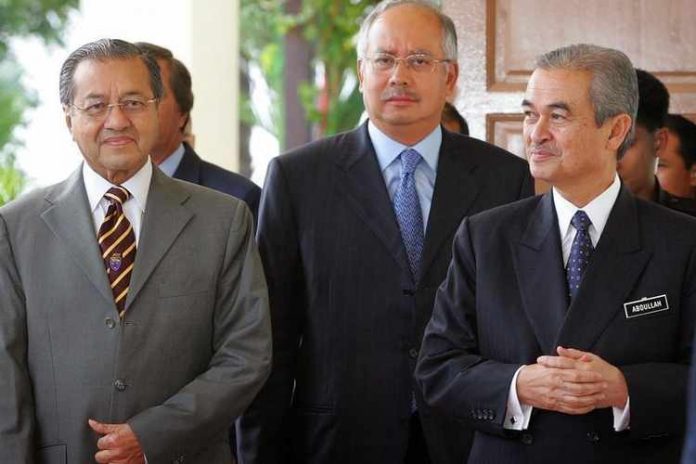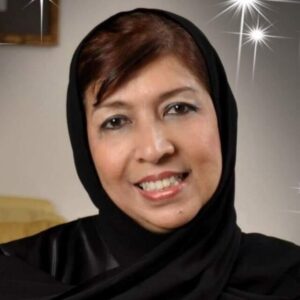

My first meeting with Tun Abdullah Badawi, or Pak Lah as he is fondly referred to, was during a press conference when he was the Foreign Affairs Minister, circa 1991 or 1992, and I was a journalist with the New Straits Times. My immediate thought about the younger Pak Lah was: What a debonair man, so polished, befitting his role as Foreign Affairs Minister. He spoke well and had a very affable quality about him. – Hasnah Abdul Rahman, Editor-In Chief, New Malaysia Herald. Today, we continue with Part 2 of a 3-part series on Malaysia’s former Prime Ministers. Read Part 1 here.

It is that quality about him that was prevalent during his tenure as Prime Minister from 2003-2009, perfect for his ‘Pak Lah’ reference. His famous quote was: “Work with me, not for me” and it was the tagline that won the heart of a nation. Malaysians were so convinced in Pak Lah’s promise of cooperation and reform that he won an overwhelming 92% mandate from the people in the 2004 general election. That was his proudest moment.
Nevertheless, photos were going around of Pak Lah sleeping – the image most people had of him, so much so he was also called “The Sleeping Prime Minister” because of his tendency to fall asleep. His general image was of inept and weakness, and that was how his opponents portrayed him as such. Despite the attacks, Pak Lah rarely engaged in their verbal warfare.
But not many knew that his falling asleep was due to a medical condition called obstructive sleep apnoea, which disturbs your normal sleeping patterns, causing the person to lose sleep and be tired most of the day. Meanwhile, he has since undergone a successful surgery in Australia in 2007.
Apart from my interactions with him as a journalist, I only organised two events that had him as the Guest of Honour. One was the launch of a property development project, which after all the planning and discussions with him and his team earlier, he did not turn up and we were only informed that very morning itself! I think his officers messed up, but what was really upsetting was that they did not deputise someone to take his place, and we had an event without a guest of honour! But we managed to work around that disappointment in the nick of time, earning me the nickname of “Miss Solution Provider”.
The other event that I helped to organise with Pak Lah as the host was a buka puasa do for UMNO leaders at PWTC in 2005, the night before his late wife, Tun Endon, passed away. I was the emcee for the event, first time hosting an event where I had to speak in Bahasa Melayu as I was not that fluent in BM, something I am not very proud of. But I managed to pass through the evening with the help of a script at hand. Just after the maghrib prayers, I had to make the announcement that the Prime Minister had to leave the venue due to an emergency. I was not told what the emergency was, but the next morning there was an announcement that the PM’s wife had passed away after a long illness battling end-stage breast cancer. But I remembered Pak Lah’s face that night before he left, it was full of anguish and pain and I am glad he left the venue to be with her before she blew her last breath. That night was also the first time that I met the PM’s son-in-law, Khairy Jamaluddin. My immediate thought was: Hmmm, he’s not as dashing as some said he is. But I guess along the way he managed to spruce himself up, after all, with your FIL as the PM, surely you have to look the part right?
In any case, one of the reasons that made Pak Lah a practical Prime Minister was the fact that he focused on enhancing agriculture, a much-needed move at a time when the world was moving towards a recession. He wanted to transform the agriculture industry into one capable of expanding Malaysia’s economy, which is why four of the five development corridors he established had emphasis on agriculture. So what FRUITS did his efforts produce?
In the mid-term review report by the Economic Planning Unit, export value of agriculture commodities grew from RM37.5 billion to RM52.4 billion from 2005 to 2007, that’s almost 40%! Agricultural-based products increased from RM35.6 billion to RM45.3 billion at the same time as well. Other related aspects Pak Lah focused on were biotechnology and encouraging manufacture based SMEs, which created job opportunities and reduced poverty at the same time, you can read more about the results here.

Although agriculture was not one of the main initiatives mentioned in the 10th Malaysia plan, Pak Lah’s corridor initiatives were continued. Though contributing less and less to Malaysia’s income every year, agriculture remains an important industry as a means to feed the rakyat.
So He Took The Economic Plan From Mega Buildings To Farming
Was it the right thing to do at that time? Pak Lah had his reasons. Mahathir is famous for his legacy of cool and expensive projects, which no doubt had put Malaysia in the international spotlight. As mentioned in our first article, less famous (and impressive) were the debts the projects built up, not to mention other of his lesser known efforts that failed expensively.
“Can you imagine if I had succumbed to Mahathir’s continued pressure to spend when the deficit was already so high, how would Malaysia have weathered the oil and financial crisis which subsequently came up in 2008. If we had not been prudent then, and continued to spend, I can tell you we would be bankrupt by now…” – In an interview with the authors of Awakening: The Abdullah Badawi Years in Malaysia
Based on the quote, Pak Lah knew that continued spending and expansion is not the solution for Malaysia. So in his 9th Malaysia Plan, he poured 11.4 billion ringgit to stimulate the agriculture sector and its related industries, that’s 84% more than what was allocated in the 8th Malaysia plan.
Did You Know That He Whipped The Government Agencies Into Shape?
In the past few years, we’ve been enjoying more and more streamlined and convenient government services, thanks to the initiatives of PM Najib’s 10th Malaysian plan. But Pak Lah also did his part earlier, as mentioned, in this academic paper published in 2010: “Abdullah has made a number of unscheduled visits to several government agencies in order to ensure the upgrading and maintenance of good and quality civil service.”
I like the way cilisos.my phrased it: Like a loving boyfriend, he would take time out of his busy schedule to go spend time with his beloved, which in this case is the quality of civil service. Or in the civil servant’s case, it’s literally the biggest boss of the company dropping in by surprise to check on you.
It must have been noted that under his supervision,
- The Board of Internal Revenue now process repayments in two days’ time instead of the previous two-week duration
- Tax payments and refunds can be made via e-filing within the duration of 30 days
- 14 various licenses required for the hotel industry have now been combined into one license;
- Renewing of business licenses can be done within 15 minutes instead of the previous one-day requirement;
- 98 percent of deals and works pertaining to land and property which had been left uncompleted and unsettled since 2001 was resolved
And that’s not even all of it. An efficient government had always been Pak Lah’s goal since taking office as Prime Minister, and he managed to deliver results on that front.
Islam Hadari
Badawi during his time as Prime Minister and chairman of the Organisation of the Islamic Conference (OIC), which by the way is a SECOND largest inter-governmental organization in the world, introduced an ideology called Islam Hadhari (trans: civillisational Islam). It’s a government concept that aims to develop a country both physically and spiritually. It aims to promote the fundamental values and noble ideals of Islam.
Pak Lah and his movement received international praise from muslims and non-muslims alike, calling it a global example of adapting Islam for modern challenges . Faith in God, mastery of knowledge, a trustworthy government, good quality of life and even protection of women and minority were among the ten principles hoped to achieved by Islam Hadhari, and his efforts in regard to a few of these aims will be demonstrated in the coming points.
According to Radzi Latiff, President, Yayasan Kajian dan Strategi Melayu : “Pak Lah exhibited qualities that were unthinkable to those who were not used to his style of leadership — he was open, flexible, tolerated contrarian views and encouraged people to speak up. These qualities may have made him seem weak but Pak Lah knew what kind of leader he wanted to be — one who allowed and encouraged public dialogue and debate on national issues.However, Pak Lah’s daring new style of administration also had its disadvantages. When a leader is very different from his predecessor, you run the risk of failing to control the situation, maybe even losing your influence and post, which is what ultimately happened to Pak Lah.”
On Friday, I will share about my interactions with Najib Razak – from the time when he was a Minister, a Deputy Prime Minister, and Prime Minister till now when he is just a Member of Parliament, but still very much a force to be reckoned with. – New Malaysia Herald


Datin Hasnah is the co-founder and CEO of New Malaysia Herald based in Kuala Lumpur, Malaysia.
With an extensive background in mass communication and journalism, she works on building up New Malaysia Herald and it’s partner sites. A tireless and passionate evangalist, she champions autism studies and support groups.
Datin Hasnah is also the Editor in Chief of New Malaysia Herald.

Facebook Comments